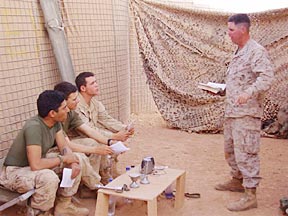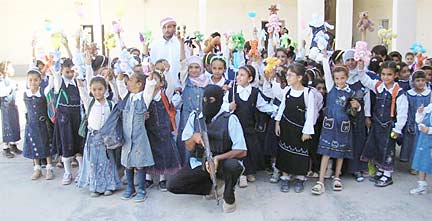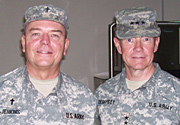Posted: 5/25/07
FRONTLINE MINISTRY:
Baptist chaplain meets spiritual needs in combat
By Barbara Bedrick
BGCT Communications
The closer people get to a foxhole, the more spiritual they generally become, a frontline military chaplain observed.
Tough circumstances—and the accompanying escalated interest in spiritual matters—provide countless opportunities for military chaplains like U.S. Navy Capt. Bill Perdue of the 1st Marine Division, who recently returned from a one-year tour of duty in Baghdad and Fallujah as a multi-national Marine Expeditionary Force chaplain.
“On three occasions, rocket and mortar fire landed within 50 yards of our chapel and killed a civilian contractor 30 feet away,” Perdue recalled.
Perdue, a Baptist General Convention of Texas-endorsed chaplain, prays with military convoys before they go out, and he helps lead Bible studies, support groups and worship services.
Danger never is far away, but Perdue insists “duty, fear of letting other chaplains down and a deep desire for Marines and sailors to have a positive image and role model of faith in the midst of crisis” keep him motivated.
In addition to directing 48 chaplains and their religious program specialists—who serve as the chaplains’ bodyguards—in ministering to about 32,000 Marines on the battlefield, Perdue served as adviser to Maj. Gen. Richard Zilmer on spiritual, ethical, moral and religious issues.
In the combat zone, each chaplain ministers to a group of 500 to 1,000 Marines, which is “something like being the pastor of a church, but it’s more like you are with them wherever they go,” Perdue added.
“You have the opportunity to invest yourself with them in a combat setting, to be in the foxhole with them, to go on patrols and convoys, to pray with them before they go out on patrols and to counsel with them when they have issues such as family problems, grief concerns or other stress and spiritual needs,” Perdue said.
One of 850 active-duty military chaplains, Perdue says about one in three are Baptists. Perdue, who calls Cranes Mill Baptist Church at Canyon Lake his home church, began his military career as a Navy F-4 jet fighter pilot, graduated from Baylor University, received his master of divinity degree from Southwestern Baptist Theological Seminary and was ordained by Baptist Temple Church in San Antonio.
Perdue was one of the first chaplains endorsed by the BGCT. They now number 410, noted Bobby Smith, BGCT chaplaincy relations director.
Ministering at the chapel or in foxholes, Perdue has witnessed hundreds of people come to faith in Christ.
Dozens of Marines have been baptized in the Euphrates River, water-filled buckets of bulldozers, holes dug in the ground and in water tanks, he noted.
At Fallujah, about 8,000 Marines attend as many as 15 services and Bible studies each week. Weekly worship services average about 800 people.
As Iraqi mortar fire rips through the air, military chaplains work to mold relationships in the trenches, at military bases and in chapels, he said. Enemy fire has no respect for human lives, but military chaplains are touching lives in extraordinary ways.
“Where faith has been jarred because of the horrors of war, chaplains have the opportunity to counsel,” Perdue said. “The more the chaplains are with the Marines … they build up their credibility with them. Later, they will come to the chaplains and unload. And it’s in that setting the chaplain has opportunity to touch them in their spiritual lives.”
 |
| U.S. Marine Chaplain Greg Cates conducts a hasty and humble Bible study. |
But even the faithful start to question when mortar fire kills a colleague only yards away. “Being near death, being near explosions, seeing your Marines injured, and visiting Marines in medical facilities who have lost limbs or been victim of improvised explosive devices can cause your faith to weaken,” Perdue acknowledged.
Many people wonder how God can permit injury and death in the combat zone, Perdue said. But that is when chaplains encourage a closer walk with God through worship, study and prayer.
When he visited Marine and Army forces at Ramadi in July 2006, casualties were brought into the morgue, Perdue recalled. Improvised explosive devices killed three soldiers.
“Along with my Roman Catholic chaplain friend, we entered the morgue and gathered the staff around the body bags,” Perdue said. “In the midst of death and grief and stress, we offered Scripture readings and prayers.”
Afterward, they talked at length with the staff who knew the dead personally.
“Because we were there, we were able to offer the hope, love and grace that our Lord Jesus offers,” Perdue said.
Ministering in wartime can cause even chaplains to question their faith. Perdue recalled how one chaplain could not enter the morgue because he thought he had seen too many bodies in recent months.
Still, Perdue remembers praying for the 100th time for God to spare his life and the lives of others as sniper and rocket fire hit nearby.
“As a chaplain, you try to use every little thing you can to influence others. We often use the chapel as a testimony to God’s protection,” Perdue said.
 |
| Iraqi children play with toy guns outside the insurgent wing at a Baghdad hospital where U.S. Marine Chaplain Bill Perdue ministered to about a dozen injured soldiers. |
Perdue relies on his faith to help him survive as a chaplain and to help others in combat, which he calls one of the most stressful situations facing a human.
“I have always believed that nothing can come into my life without God’s permission,” he said. He has found that belief a source of strength when his faith is tested.
For Perdue, the most meaningful part of his chaplaincy duties in Iraq is the opportunity to preach and lead worship in a combat zone.
“Life-and-death issues, normally suppressed by 20-somethings, are vivid and critical,” Perdue notes. “The Scripture always comes alive in preaching, but it seemed particularly relevant at Fallujah as we gathered weekly to worship and remember those who were killed or injured the week before.”
One of Perdue’s most meaningful memories that affected the entire Marine force was the role he played in shepherding the development of a “warrior transition” program, which deals with post-deployment operational stress. It educates all Marines on the signs and symptoms of operational stress that could lead to post traumatic stress syndrome.
Helping military personnel who have been injured in combat return to life back home resonates with retired military chaplain Brig. Gen. Jim Spivey, who lives in Fort. Worth. As president of the Military Chaplaincy Association, Spivey points out that an actual brain injury suffered in combat may not have initially been discernible. One of the most critical problems facing returning troops is post-traumatic stress disorder, he added.
“Where the rubber meets the road is when people return to their homes and to their churches,” Spivey said. “Most of our pastors and our church staff members have no military background or context to understand the problems, yet many have members who are returning from war.”
There is a growing need to help churches gain a greater appreciation and understanding of the problem so they can assist returning military church members, he said. The church has a “critical role in that,” he added.
Chaplains sometimes have opportunities to share with the most unlikely people. Perdue called his encounter with an imam at Haditha an “extraordinary event” that showed him people of different faiths, even amid strife and turmoil, can find common ground and engage in dialogue.
From counseling to pastoral care at surgical units, taking care of the wounded and stressed, and praying, chaplains like Perdue face their own struggles on the battlefield, but when they can make a difference in someone’s life, it somehow seems easier to bear.
“What impacts lives the most on the battlefield is the presence of a chaplain, to be with people wherever they are,” Perdue said. “Seeing a Marine who attended worship services two weeks ago now come to be baptized” makes it worthwhile.
Support from home makes a difference as well. Hundreds of churches and individuals are helping make combat life easier. They have sent thousands of boxes to Iraq directly to the chaplains to distribute. Perdue’s home church of about 100 members regularly sends boxes of anything from toothpaste to baby wipes to magazines to peanuts and popcorn.
Perdue will retire in September 2008 and plans to return to Texas.
News of religion, faith, missions, Bible study and Christian ministry among Baptist churches, in Texas, the BGCT, the nation and around the world.


